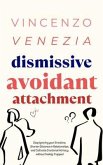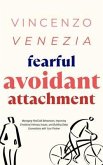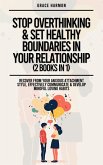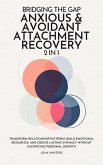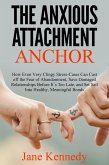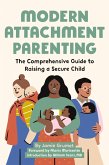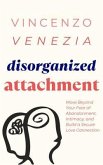Do you constantly think that your partner will leave you or that you will be abandoned?
Maybe you are struggling with jealousy, worried that no matter how hard you try, you are never good enough?
Are you afraid of ruining everything by making even the smallest mistake?
Do you feel like you have to walk on eggshells in your relationship?
Those with an anxious/concerned attachment style might think highly of others, but they often suffer from low self-esteem, are sensitive and attuned to their partners' needs, but are often insecure and anxious about their own value in a relationship.
Generally, adults with anxious attachment need constant reassurance that they are loved, worthy and good enough.
If their loved one rejects them or does not meet their needs, they may blame themselves or label themselves as not worthy of love.
During childhood they are likely to have had anxious parents who dumped a lot of worries on them, or parents who were absent or had inconsistent
responses to their children's needs.
In an intimate relationship, many anxious adults will make themselves indispensable to their partners. They think, "If they need me, they won't leave me." They want to feel needed.
But this will backfire. After all the work you have done, you always wonder if they really love you for who you are or only for as long as you make yourself useful.
I recommend reading this book if in your relationship:
- You are sensitive and hyper-vigilant to any emotional unavailability.
- You crave closeness.
- You need a lot of reassurance that people care about you.
- You constantly think that your partner will leave you or that you will be abandoned.
- You are full of worries and doubts about your relationship, especially in the early stages.
- You are jealous.
- You take most of the responsibility, guilt and blame in a relationship.
- You are controlling.
- You are often worried about infidelity.
- You tend to act, do or say things that you later regret.
- You are overly sensitive to your partner's actions and moods.
- You take on most of the responsibility, guilt and blame in a relationship.
Living this way is exhausting. The constant feeling of not being worthy and at the same time obsessively wanting love drains your energy. It feels like being on top of an emotional roller coaster.
If you feel in tune with this description of life, remember that it is not your fault and that because you have experienced bad situations in life, you have become sensitive and more compassionate than others.
Can the anxious-preoccupied attachment style be changed?
Fortunately, there are methods in this manual to identify and interrupt dysfunctional patterns and cultivate new ones that are helpful and tailored to you. It is important to do this for yourself, your loved ones and, eventually, your children.
Stop that feeling of never being enough forever. Take action now.
Maybe you are struggling with jealousy, worried that no matter how hard you try, you are never good enough?
Are you afraid of ruining everything by making even the smallest mistake?
Do you feel like you have to walk on eggshells in your relationship?
Those with an anxious/concerned attachment style might think highly of others, but they often suffer from low self-esteem, are sensitive and attuned to their partners' needs, but are often insecure and anxious about their own value in a relationship.
Generally, adults with anxious attachment need constant reassurance that they are loved, worthy and good enough.
If their loved one rejects them or does not meet their needs, they may blame themselves or label themselves as not worthy of love.
During childhood they are likely to have had anxious parents who dumped a lot of worries on them, or parents who were absent or had inconsistent
responses to their children's needs.
In an intimate relationship, many anxious adults will make themselves indispensable to their partners. They think, "If they need me, they won't leave me." They want to feel needed.
But this will backfire. After all the work you have done, you always wonder if they really love you for who you are or only for as long as you make yourself useful.
I recommend reading this book if in your relationship:
- You are sensitive and hyper-vigilant to any emotional unavailability.
- You crave closeness.
- You need a lot of reassurance that people care about you.
- You constantly think that your partner will leave you or that you will be abandoned.
- You are full of worries and doubts about your relationship, especially in the early stages.
- You are jealous.
- You take most of the responsibility, guilt and blame in a relationship.
- You are controlling.
- You are often worried about infidelity.
- You tend to act, do or say things that you later regret.
- You are overly sensitive to your partner's actions and moods.
- You take on most of the responsibility, guilt and blame in a relationship.
Living this way is exhausting. The constant feeling of not being worthy and at the same time obsessively wanting love drains your energy. It feels like being on top of an emotional roller coaster.
If you feel in tune with this description of life, remember that it is not your fault and that because you have experienced bad situations in life, you have become sensitive and more compassionate than others.
Can the anxious-preoccupied attachment style be changed?
Fortunately, there are methods in this manual to identify and interrupt dysfunctional patterns and cultivate new ones that are helpful and tailored to you. It is important to do this for yourself, your loved ones and, eventually, your children.
Stop that feeling of never being enough forever. Take action now.
Dieser Download kann aus rechtlichen Gründen nur mit Rechnungsadresse in A, D ausgeliefert werden.



